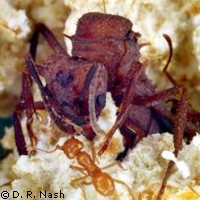Cheating and corruption rife among ants
Ants - Eusocial insects of the family Formicidae - are renowned for their extremely organised colonies and nests. However, a recent study conducted by researchers at Leeds University and the University of Copenhagen shows that despite their organisational skills, ants are quite capable of cheating and being corrupt, regardless of whether they are workers, drones or queens. The findings of the study, funded by the Carlsberg Foundation, were recently published in the Proceedings of the National Academy of Sciences (PNAS). Dr Bill Hughes from the Faculty of Biology Sciences at Leeds University discovered that ants are not as quick to cooperate for the benefit of the colony, as much as they are for their own personal gain. For his part, Professor Jacobus Boomsma from Copenhagen University's Centre for Social Evolution discovered that some ants have the capacity to beat the system by making certain that their offspring will develop into reproductive queens, and not sterile workers. 'The accepted theory was that queens were produced solely by nurture,' comments Dr Hughes. 'Certain larvae were fed certain foods to prompt their development into queens and all larvae could have that opportunity,' he goes on to say. 'But we carried out DNA fingerprinting on five colonies of leaf-cutting ants and discovered that the offspring of some fathers are more likely to become queens than others.' According to Dr Hughes, these ants have a 'royal' gene or genes that push them to the top, thus putting potential contenders out of the running. While researchers knew of the existence of these 'royal' genetic lines, the common thought was that these lines were rare in each colony, most likely owing to the fact that the ants are savvy in ensuring that they move about undetected. 'If there were too many of one genetic line developing into queens in a single colony, the other ants would notice and might take action against them,' explains Dr Hughes. 'So we think that the males with these royal genes have evolved to somehow spread their offspring around more colonies and so escape detection. The rarity of the royal lines is actually an evolutionary strategy by the cheats to escape suppression by the altruistic masses that they exploit.' Ant colonies produce males and new queens several times each year, and they leave their nests to go to other colonies to meet and mate. While the males die soon after, females thrive and establish new colonies. The researchers are now seeking to determine whether their hypothesis is correct and the mating strategy of males with royal genes guarantees their rarity, to ensure that their advantages are kept under wraps from their more 'common' counterparts. 'When studying social insects like ants and bees, it's often the cooperative aspect of their society that first stands out,' remarks Dr Hughes. 'However, when you look more deeply, you can see there is conflict and cheating - and obviously human society is also a prime example of this.' Researchers used to think that ants were 'an exception, but our genetic analysis has shown that society is also rife with corruption - and royal corruption at that,' he says.
Countries
Denmark, United Kingdom



